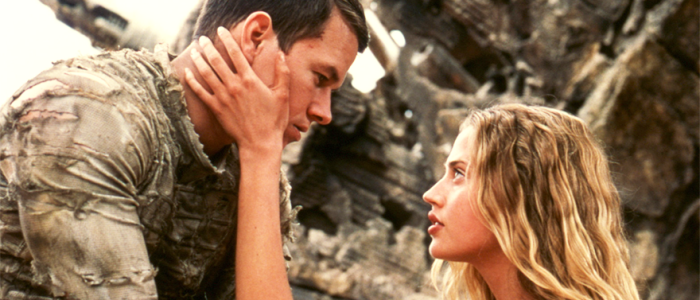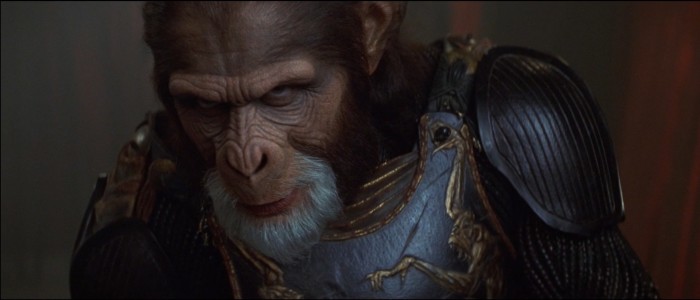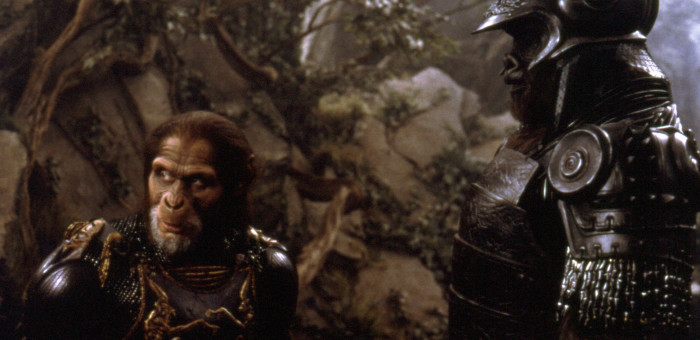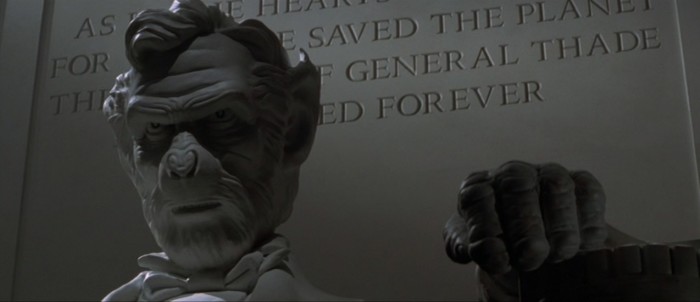Revisiting The Many Failures (And Few Triumphs) Of Tim Burton's 'Planet Of The Apes'
War for the Planet of the Apes has already received rave reviews, with many critics calling it the last great chapter in one of the best film trilogies of modern times. With so much goodwill, it almost makes fans forget about the dark point in history when it seemed like the Apes franchise was dead.
Tim Burton's 2001 Planet of the Apes reboot effectively killed the franchise for several years. The effect of the film was such that many though Rise of the Planet of the Apes would be a huge flop as it was being made. It was unclear if the audience appetite for talking apes had recovered since 2001. Thankfully, the gamble that was Rise worked.
But why did Burton's Apes fall so hard? It had everything going for it on paper. What made it fail so spectacularly? The simple answer is that it tried to outsmart the original Apes film franchise. It seemed to assume that just because the original franchise was old, it was outdated and needed a completely new revision to make it "fresh" and "relatable." However, there was nothing relatable about ape characters the audience could have cared less about, and human characters who were more annoying than sympathetic.
Talking Humans
The biggest mistake in Burton's Apes is that, for whatever reason, he put the focus squarely on the humans. Talking humans. The big selling point of the Apes films, however, aren't the humans at all.
If Burton was a scholar of Apes movie canon, he would know that 1970's Beneath the Planet of the Apes is one of the two worst films out of the entire original Apes saga. That film is weird for a lot of reasons, including having another actor, David Watson, play Roddy McDowall's Cornelius and that the film is led by Brent (James Franciscus), who was originally cast as Charlton Heston's replacement (even though Heston's Taylor does show up in the film). But the weirdest part of the film is that there is a community of reclusive, underground humans who survived the nuclear fallout. They can still talk and, for the most part, function like regular humans, but the big reveal is that they can take off their skin to reveal their true, nuked-out forms.
These humans — and the reveal of their mutant forms — is supposed to give the audience the same jump scare the sight of apes on horseback gave audience members in the first movie. But what the introduction of the humans does is actually take away focus from the main point of the films, which is to show a world in which apes have upended man — through man's own folly — in the quest for world dominance. Having talking humans takes away from the symbolism inherent in the animalistic, non-talking humans that populate the world above ground. These new human characters also take focus away from the main ape characters, whom people came to see. What's the point of going to an Apes sequel if we're going to be following the humans around?
Burton's Apes does the same thing. Instead of focusing solely on the apes, the apes are instead treated like special effects instead of well-rounded characters. Most of the characterization is extended towards the humans, who, while captive like the humans from the original Apes films, aren't the animals we were expecting. They're talking humans like you and me, who were captured from their communities in the wilderness by apes to become servants to the ape upper class.
Perhaps Burton thought this decision would make the humans more endearing, which would make the audience more invested. But again, the title of the film is Planet of the Apes. People don't want to see a film full of talking humans as the main characters if the film is supposed to be about a world of talking apes.
So, you might be asking, why do talking humans work well in these new Planet of the Apes movies? Well, it's because we have an expectation to see humans that act like us since the planet of apes is just beginning. Emotionally, the humans work in the new films because you see them grappling with their impending demise. The death throes against an existential void are what make these human characters compelling and, in many ways, just as disturbing as the apes. However, the humans in the 2001 film don't have such an arc. Even though they've never lived in a time in which humans were at the top, they are still portrayed as having a tacit knowledge of human superiority that doesn't make sense. They're just confounding characters as a whole, and Burton would have done well to get rid of them.
Lack of Focus on the Real Story
The focus on talking humans is only one element of Burton taking his eye off the ball. Overall, his Planet of the Apes misses the political and social points the original franchise made in each movie, even the bad ones. While the original story by Pierre Boulle was more of a writing exercise than a social and political allegory, Planet of the Apes successfully utilized the turmoil of the '60s as fodder for relevant discussion. In the vein of the great sci-fi stories, Planet of the Apes and its sequels made unique commentary on the human experience, touching on the McCarthy Trials, the Cold War, and the fear of communism, the civil rights movement, the Vietnam War and youth anti-war protests, the Black Power movement, and the ethics debate around nuclear arms.
Probably the most blatant the Apes franchise has ever been about a political message, in particular its message about racial tensions, was in Conquest of the Planet of the Apes, when Caesar (McDowall) tells MacDonald (Hari Rhodes), a black man working under the ape-hating governor Breck (Don Murray), that he of all people should understand why Caesar wants to secure freedom for his people. It's a line that is shocking in its self-awareness. If you were in the audience and didn't know what kind of movie you were seeing, Caesar laid it out for you.
Today's Apes franchise continues that tradition of social and political commentary. Despite getting in minor trouble over picturing Caesar with a raised "Black Power"-esque fist on one of the posters for Rise of the Planet of the Apes, the franchise has deftly covered similar themes of power and subjugation, with its most transparent moment occurring in Dawn of the Planet of the Apes, when Koba (Toby Kebbell) says Caesar loves humans more than apes. Koba's basically calling Caesar an "Uncle Tom," a term a black person uses to insult another black person they think has ventured into the Sunken Place of wanting to be accepted and nurtured by mainstream white culture.
The new Apes franchise has also tackled animal rights and the ethics of animal testing, the possible outcomes of science without oversight, and the question of what makes us human. Ultimately, the film posits that despite not being of human origin, Caesar is probably the most human of all.
However, Burton's Apes fails to deliver any message. Even its own plot — helping the humans escape their bonds and journey to freedom — becomes convoluted in a strange love triangle between Capt. Leo Davidson (Mark Whalberg), human-sympathizing ape Ari (Helena Bonham Carter), and human Daena (Estella Warren), as well as a huge set piece ending involving the movie's villain Thade (Tim Roth) believing Whalberg's monkey astronaut companion was the second coming of their ape god. What does Burton's film tell us about the world at large? Nothing. At most, Burton's Apes is just a big excuse to do stellar ape makeup. At worst, it's an attempt to try and outdo the original Apes, to fix something that wasn't ever broken. By trying to show the original Apes "how it's done," as it were, Burton's Apes film played itself.
Credit Where It’s Due
There are some positives that have to be stated, though. Even though Burton wrongly thought of Planet of the Apes as just a creature feature, the makeup in the film does showcase how far special effects makeup has come since the 1960s. Master makeup artist Rick Baker did great work, and for that, the film should be commended (even if the apes kind of look like an odd cross of the Jacksons and Paula Abdul).
There is a ton of craftsmanship in this film, and the amount of work that was put into the costuming, set design and the rigorous training the actors had to do to seem ape-like shouldn't go unnoticed. It's just a shame all of that work didn't pay off. Despite my ragging on Burton in this article, you can tell there was still a kernel of earnestness there. No one wants to put out a bad film, especially one as costly and time-consuming as this one.
Also, the ending of the film is somewhat impressive. Yes, it's corny to have an ape Abraham Lincoln statue. But in the original ending of the book, our astronaut hero goes back to what he thinks is the present day, only to find that the present day is full of apes. There's still no Lincoln statue in the book, but in its own way, the ending of the film actually does reference the ending of the source material.
Also, the lead-up to the film and the months after ,reminded movie fans why they loved the original Planet of the Apes to begin with, leading to tons of Apes merchandise. It was during this time my mom and I were finally able to buy the entire series of films, so on that level, Burton's Apes did something good.
Where 2001’s Planet of the Apes Sits in the Apes Canon
So, what place does Burton's Apes take when looking at the entirety of the Apes catalogue? It's a tough call. On the one hand, it's easiest to just block it out and pretend it never existed, which is what many Apes fans do. However, you can't not acknowledge it and its footprint in Hollywood filmmaking.
Therefore, it might be best to just acknowledge the film for what it is. Is it a bad movie? Of course it is. As a hardcore Apes fan, it doesn't have much to redeem itself with in my book, aside from what I've already mentioned. However, it did provide the current Apes crew with a play-by-play of what not to do when reviving the Apes franchise. You make sure the central subject is an ape, you give the humans secondary, almost futile roles, and you organically weave in macro discussions about our world into the story. Basically, an Apes filmmaker needs to follow the tried-and-true method laid out by the original Apes films, because they were successful due to the sum of its political and social parts, not just the ape makeup.
Overall, Burton's Apes stands as a monolith, a piece of film to study, dissect, and learn from when it comes to the art of storytelling. Sometimes, you don't need to try to outwit your source material. Otherwise you might come out looking like a fool.




